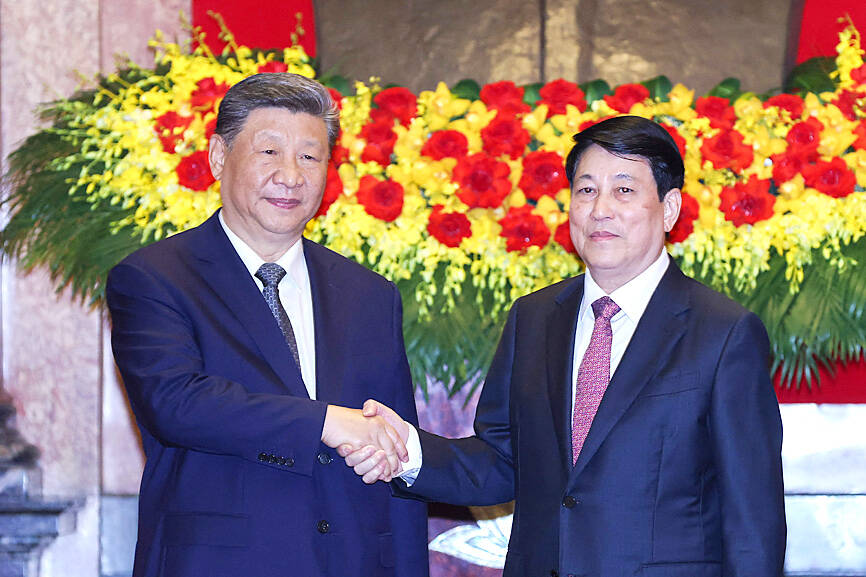Chinese President Xi Jinping (習近平) yesterday urged Vietnam to join forces in upholding free trade before wrapping up a visit to Hanoi which US President Donald Trump said was aiming to “screw” the US.
Xi visited Vietnam as part of a Southeast Asia tour that is to include Malaysia and Cambodia, with Beijing trying to position itself as a stable alternative to Trump as leaders confront US tariffs.
The Chinese leader on Monday called on his nation and Vietnam to “oppose unilateral bullying and uphold the stability of the global free trade system,” Chinese state media reported.

Photo: AFP
Hours later, Trump told reporters at the White House that the talks were aimed at hurting the US.
“I don’t blame China. I don’t blame Vietnam. I don’t. I see they’re meeting today, and that’s wonderful,” he said. “That’s a lovely meeting ... like trying to figure out, how do we screw the United States of America.”
China and Vietnam on Monday signed 45 cooperation agreements, including on supply chains, artificial intelligence, joint maritime patrols and railway development.
Xi at a meeting with Vietnamese Communist Party General Secretary To Lam on Monday said that their nations were “standing at the turning point of history ... and should move forward with joined hands.”
Lam said after the talks that the two leaders “reached many important and comprehensive common perceptions,” Vietnam News Agency reported.
Before leaving for Malaysia, Xi laid a red wreath emblazoned with his name and the words “Long live Vietnam’s great leader President Ho Chi Minh” at the late leader’s mausoleum in central Hanoi.
He also attended the launch of the Vietnam-China Railway Cooperation project, which is to manage an US$8 billion rail project — announced this year — to link Vietnam’s largest northern port city to the border with China.
The rail link is a “matter of great concern” to the leaders of the two nations, Vietnam News Agency said.
The new rail line would run through some of Vietnam’s key manufacturing hubs, home global giants who rely on a regular flow of components from China.
Xi’s trip came almost two weeks after the US — the biggest export market for Vietnam in the first three months of the year — imposed a 46 percent tariff on Vietnamese goods as part of a global blitz.
Although the US tariffs on the manufacturing powerhouse and most other nations have been paused, China still faces enormous levies and is seeking to tighten regional trade ties and offset their impact during Xi’s first overseas trip of the year.
The Chinese president was traveling to Malaysia before visiting Cambodia on a tour that “bears major importance” for the broader region, Beijing said.

INVESTIGATION: The case is the latest instance of a DPP figure being implicated in an espionage network accused of allegedly leaking information to Chinese intelligence Democratic Progressive Party (DPP) member Ho Jen-chieh (何仁傑) was detained and held incommunicado yesterday on suspicion of spying for China during his tenure as assistant to then-minister of foreign affairs Joseph Wu (吳釗燮). The Taipei District Prosecutors’ Office said Ho was implicated during its investigation into alleged spying activities by former Presidential Office consultant Wu Shang-yu (吳尚雨). Prosecutors said there is reason to believe Ho breached the National Security Act (國家安全法) by leaking classified Ministry of Foreign Affairs information to Chinese intelligence. Following interrogation, prosecutors petitioned the Taipei District Court to detain Ho, citing concerns over potential collusion or tampering of evidence. The

NEGOTIATIONS: Taiwan has good relations with Washington and the outlook for the negotiations looks promising, Minister of Economic Affairs J.W. Kuo said Taiwan’s GDP growth this year is expected to decrease by 0.43 to 1.61 percentage points due to the effects of US tariffs, National Development Council (NDC) Minister Paul Liu (劉鏡清) said at a meeting of the legislature’s Economics Committee in Taipei yesterday, citing a preliminary estimate by a private research institution. Taiwan’s economy would be significantly affected by the 32 percent “reciprocal” tariffs slapped by the US, which took effect yesterday, Liu said, adding that GDP growth could fall below 3 percent and potentially even dip below 2 percent to 1.53 percent this year. The council has commissioned another institution

NEGOTIATIONS: The US response to the countermeasures and plans Taiwan presented has been positive, including boosting procurement and investment, the president said Taiwan is included in the first group for trade negotiations with the US, President William Lai (賴清德) said yesterday, as he seeks to shield Taiwanese exporters from a 32 percent tariff. In Washington, US Trade Representative Jamieson Greer said in an interview on Fox News on Thursday that he would speak to his Taiwanese and Israeli counterparts yesterday about tariffs after holding a long discussion with the Vietnamese earlier. US President Donald Trump on Wednesday postponed punishing levies on multiple trade partners, including Taiwan, for three months after trillions of US dollars were wiped off global markets. He has maintained a 10 percent

TRADE: The premier pledged safeguards on ‘Made in Taiwan’ labeling, anti-dumping measures and stricter export controls to strengthen its position in trade talks Products labeled “made in Taiwan” must be genuinely made in Taiwan, Premier Cho Jung-tai (卓榮泰) said yesterday, vowing to enforce strict safeguards against “origin laundering” and initiate anti-dumping investigations to prevent China dumping its products in Taiwan. Cho made the remarks in a discussion session with representatives from industries in Kaohsiung. In response to the US government’s recent announcement of “reciprocal” tariffs on its trading partners, President William Lai (賴清德) and Cho last week began a series of consultations with industry leaders nationwide to gather feedback and address concerns. Taiwanese and US officials held a videoconference on Friday evening to discuss the